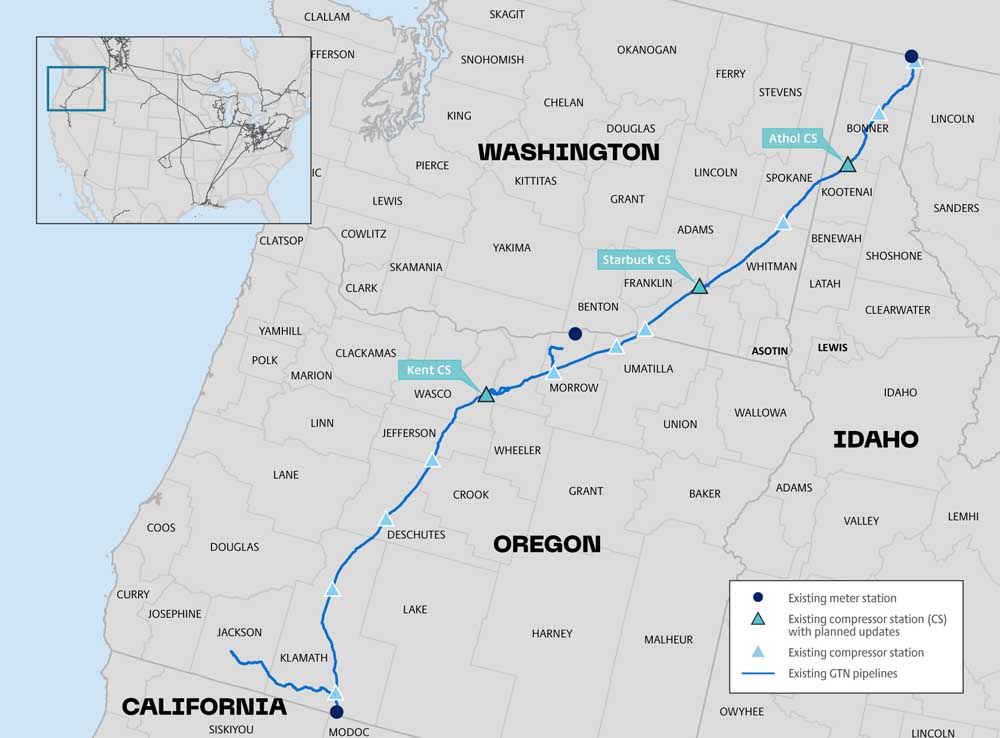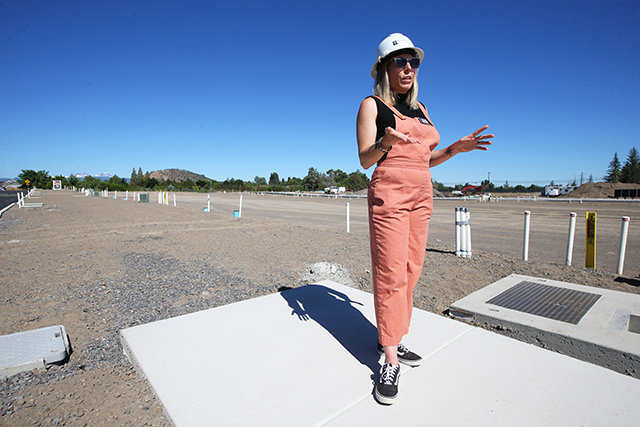Feds approve GTN Xpress natural gas pipeline expansion
Published 5:15 am Friday, October 20, 2023

- TC Energy, which provided this map, says the Gas Transmission Northwest XPress Project will upgrade three existing compressor stations on the Gas Transmission Northwest system — transporting natural gas since 1962 — to meet increasing demand from residential, commercial and industrial customers in the Pacific Northwest.
A project to increase the capacity of a natural gas pipeline along the southeastern edge of Bend received approval from the Federal Energy Regulatory Commission on Thursday morning after months of delay.
The expansion has drawn both criticism and support from federal, state and local leaders, especially since the commission, which regulates interstate electricity, natural gas and oil transmission, was previously scheduled to make a decision multiple times this year.
Trending
Gas Transmission Northwest, a subsidiary of Canadian natural gas company TC Energy, proposed in 2021 a $335 million project to increase the capacity of the pipeline. The pipeline has delivered natural gas to customers from Canada, through Idaho, Washington, Oregon and ending in Northern California since 1962.
The project, known as the GTN Xpress project, will allow for an additional 150 million cubic feet of methane through the pipeline per day.
Currently, the pipeline has the capacity for 2.7 billion cubic feet of natural gas per day.
TC Energy says the capacity expansion is critical to meet the rising demands from residential, commercial and industrial customers in the Pacific Northwest.
“The GTN XPress project will play a critical role in keeping energy affordable and reliable for consumers in California and the Pacific Northwest. We appreciate FERC’s bipartisan action today to approve the project and will work diligently to place it into service as soon as possible,” Michael Tadeo, a spokesperson for TC Energy said in an email.
The four-person commission approved the project Thursday, but two commissioners, James Danly and Allison Clements, noted they had some reservations.
Trending
Environmentalists critical of the project say the expansion would contribute an additional 3.47 million metric tons of greenhouse gas emissions every year. Local climate activists protested the project twice in downtown Bend — once in February and again in September.
Diane Hodiak, the executive director of Deschutes County-based climate advocacy nonprofit 350 Deschutes, called the commission’s decision reckless.
“Despite widespread opposition, they have ruled in favor of an irresponsible fossil fuel industry, which already has had explosions in similarly aging pipelines,” Hodiak wrote in an email to The Bulletin. “Our health, safety, and planet are severely threatened at a time when Oregon is on a pathway to beneficial electrification.”
Oregon laid out specific greenhouse gas emission reduction targets in 2021, and was the third state in the country to ban the sale of new gas-powered cars by 2035.
U.S. Rep. Lori Chavez-DeRemer, R-Happy Valley, lauded the commission’s decision in a statement Thursday, which came just more than a week after she and other representatives from the Pacific Northwest urged the commission to approve the project.
“GTNXP will support domestic energy production, which boosts our energy security while also helping lower utility bills for Oregon families,” Chavez-DeRemer said in the written statement. “Additionally, utilizing natural gas will continue to be important as we work to meet carbon reduction goals.”
Chavez-DeRemer, who represents parts of Clackamas, Deschutes, Linn and Marion counties, said the commission made the right decision.
U.S. Sen. Jeff Merkley, D-Oregon, was not as pleased.
He has staunchly opposed the expansion project since its proposal. He called Thursday’s decision “outrageous.”
“Unfortunately FERC’s approval is not a surprise because the Commission is captured by the fossil fuel industry,” Merkley said in a written statement. “There is no other explanation for how FERC could approve over 99% of the fossil fuel projects it reviews in the face of climate catastrophe. FERC needs fundamental reform.”
The project won’t change the structure of the existing pipeline. Instead, it will involve upgrades to three compressor stations in Athol, Idaho; Kent, Oregon; and Starbuck, Washington. Those stations regulate how much product flows through the pipeline.
The attorneys general from Oregon, California and Washington twice requested the commission deny the proposed expansion — in August 2022 and February 2023. Leadership from Idaho has consistently supported the project.
U.S. Sen. Ron Wyden, D-Oregon, who has opposed the project alongside Merkley and the attorneys general, said in a written statement he’ll continue to battle the expansion project in spite of the commission’s approval.
“Today’s vote rubber-stamps a pipeline expansion that’s unnecessary, unwanted and unconscionable when it’s urgent business to fight the climate crisis,” Wyden said. “This pipeline cutting right through the heart of rural Oregon between Umatilla and Jackson counties will increase rates for consumers and enrich a Canadian company with a troubling safety record.”
TC Energy also owns the Keystone Pipeline, which formed a crack in late 2022 spilling 13,000 barrels of crude oil in Washington County, Kansas, and the Columbia Gas Transmission Pipeline, a part of which exploded in Virginia in July.








